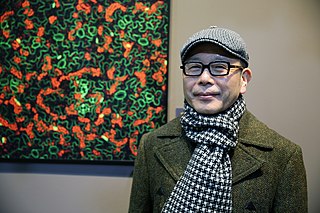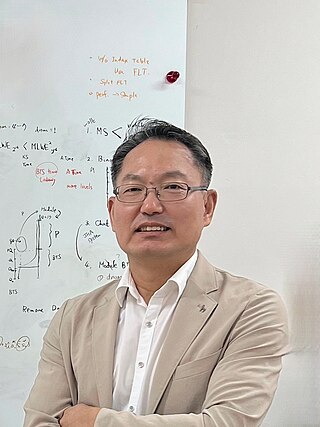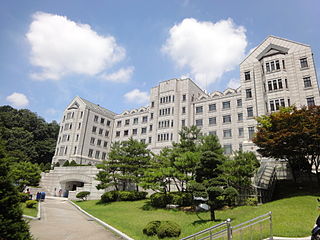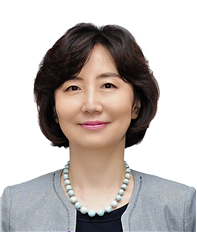Related Research Articles

The Golden Disc Awards is an annual South Korean major music awards ceremony that honors achievements in the local music industry. The awards ceremony was founded with the purpose to promote popular culture creativity,discover new artists,and contribute to the growth of the music industry. The first ceremony was held in 1986.

Cheon Jinwoo is the H.G. Underwood Professor at Yonsei University and the Director of the Center for Nanomedicine,Institute for Basic Science (IBS). As a leading chemist in inorganic materials chemistry and nanomedicine Cheon and his group research chemical principles for the preparation of complex inorganic materials. He has been a Clarivate Analytics Highly Cited Researcher both in the field of chemistry in 2014,2015,2016 and cross-field in 2018. He is a fellow of the American Chemical Society,Royal Society of Chemistry,and Korean Academy of Science and Technology,a senior editor of Accounts of Chemical Research and an editorial advisory board member of Journal of Materials Chemistry,Nano Letters and Materials Horizons.

Eunjoon Kim is a professor of KAIST and director of Center for Synaptic Brain Dysfunctions within the Institute for Basic Science (IBS). His current research focuses on molecular mechanisms underlying autism spectrum disorders and synaptic brain dysfunctions. With over 200 publications to his name,his research has been cited over 27,000 times giving him an h-index of 81. He graduated from Busan National University in 1986,received master's degree at KAIST in 1988,received PhD degree at Michigan State University in 1994,and worked at Harvard Medical School as a postdoctoral fellow during 1995-1996. His current research focuses on molecular organization of neuronal synapses and synapse dysfunction-related psychiatric disorders.

Hong Gil Nam is a South Korean biologist teaching in the Department of New Biology of Daegu Gyeongbuk Institute of Science and Technology and leading research as director of the Center for Plant Aging Research. His research interests include comparative aging in diverse kingdoms,including plant and animals,to reveal aging mechanisms among species,cross-kingdom interaction between plants and animals,and biochemistry at nano and micro levels. He is the founder and former director of the Biological Research Information Center,a member of the Korean Academy of Science and Technology,and has served on the editorial board in Molecular Plant since 2013.

Cheon,Jung Hee is a South Korean cryptographer and mathematician whose research interest includes computational number theory,cryptography,and information security. He is one of the inventors of braid cryptography,one of group-based cryptography,and approximate homomorphic encryption HEAAN. As one of co-inventors of approximate homomorphic encryption HEaaN,he is actively working on homomorphic encryptions and their applications including machine learning,homomorphic control systems,and DNA computation on encrypted data. He is particularly known for his work on an efficient algorithm on strong DH problem. He received the best paper award in Asiacrypt 2008 for improving Pollard rho algorithm,and the best paper award in Eurocrypt 2015 for attacking Multilinear Maps. He was also selected as Scientist of the month by Korean government in 2018 and won the POSCO TJ Park Prize in 2019.

The R. K. Cho Economics Prize is awarded by Yonsei University in Seoul,South Korea to academics in the field of economics who have contributed to the development of scholarship and education. As of 2018,the prize includes a plaque,a medal,and a monetary award of ₩100 million.

Koh Gou Young is a researcher from South Korea studying organ vasculature and lymphatic vessels with an interest in angiogenesis,lymphangiogenesis,adipogenesis,and cardiogenesis. His research has contributed to the publication of more than 200 journal articles,including multiple publications on how Tie2 deficits are related to sepsis,blood-retinal barrier damage,and an imbalance of intraocular pressure in Schlemm's canal which induces glaucoma.
The Korea Science Award is an award presented to South Koreans and Korean scientists working in domestic universities or research positions. It is currently jointly presented by the Ministry of Science and ICT and the National Research Foundation of Korea. Research achievements are limited to that of a single project conducted in Korea. Potential recipients go through a several stage review which includes consolation with foreign scholars.

Choi Kiwoon is a theoretical particle physicist researching focusing on particle theory and cosmology. He was a research professor at Chonbuk National University and a full professor at KAIST. He is the founding director of the Institute for Basic Science Center for Theoretical Physics of the Universe. He is a member of the Korean Academy of Science and Technology.

Oum Sang-il is a Korean mathematician working in graph theory and discrete mathematics. He is a tenured professor in the Department of Mathematical Sciences at KAIST and the chief investigator of the Discrete Mathematics Group in the Pioneer Research Center for Mathematical and Computational Sciences at the Institute for Basic Science. He is known for his work on structural graph theory and in particular for structures and algorithms relating to rank-width,clique-width,and branch-width. He published more than 45 journal papers.
The Young Scientist Award is a Korean award for young scientists under the age of 40 with research and development achievements in the natural sciences and engineering fields. Four recipients are selected on an annual basis. While the award is organized by the Korean Academy of Science and Technology,it is given on behalf of the president of Korea,and comes with prize money of initially KRW 30 million,and later KRW 50 million. Candidates for the award must be Korean or working within Korea at a university or research institute. The award is presented to natural science researchers in even-numbered years and engineering in odd-numbered years.

Park Jeong Young (Korean: 박정영),sometimes written as Park,Jeong Y.,is a professor in the Department of Chemistry at KAIST and associate director at the Center for Nanomaterials and Chemical Reactions at the Institute for Basic Science. He is a member of the American Chemical Society and American Vacuum Society among others,an international committee member of Asian Science Camp,and has served on the editorial boards of Scientific Reports,Advanced Materials Interfaces,Journal of the Korean Physical Society,and New Physics.
The Korea Engineering Award is an award presented to South Koreans and Korean engineers working in domestic universities or research positions. It is currently jointly presented by the Ministry of Science and ICT and the National Research Foundation of Korea. Research achievements are limited to that of a single project conducted in Korea. Potential recipients go through a several stage review which includes consolation with foreign scholars. It is given annually to up to four individuals and is presented with the Korea Science Award. Prize money of KRW 30 million is given in addition to the award.

Inhee Mook-Jung (묵인희) is a South Korean scientist who works at the Seoul National University School of Medicine.
Top Scientist and Technologist Award of Korea (Korean: 대한민국최고과학기술인상) is one of two annual awards given in South Korea by the Korean Federation of Science and Technology Societies with the other being a government award for contribution to science and technology promotion. The Top Scientist and Technologist Award of Korea was started in 2003 as the successor to the Science and Technology Award of Korea which was established in 1968. The award is to foster honor and pride and create an environment in which people can focus on research and development by discovering and encouraging scientists and engineers with outstanding achievements who can represent South Korea. While previously given to multiple individuals,from 2003 only person is selected for each cycle. Laureates receive the award and 300 million KRW cash prize.

Kim Jae Kyoung is a biomedical mathematician and associate professor at KAIST in the Department of Mathematical Sciences and a chief investigator in the Pioneer Research Center for Mathematical and Computational Sciences at the Institute for Basic Science. His research focuses on mathematical biology and medicine,specifically the combination of nonlinear dynamics,the theory of stochastic processes,and computational science,to better understand disease mechanisms and develop relevant treatment strategies,including drug and digital medicine for sleep disorders.
References
- ↑ "Jinwoo Cheon wins POSCO TJ Prize". Chemistry Department. University of Illinois Urbana-Champaign . Retrieved 23 November 2023.
- ↑ 정탁윤 (26 March 2008). "포스코, '2008 포스코 청암상' 시상". NewsPim (in Korean). Retrieved 23 November 2023.
- ↑ "Professor Mu-Hyun Baik Honored with the POSCO TJ Park Prize". KAIST . 11 March 2021. Retrieved 23 November 2023.
- ↑ "Posco Asia Fellowship 2024". Youth Opportunities. Retrieved 23 November 2023.
- ↑ "Associate Director BAIK Mu-Hyun Wins the POSCO TJ Park Prize: In recognition of identifying the mechanism of chemical synthesis assisted by transition metal catalysts". Institute for Basic Science . 15 March 2021. Retrieved 22 November 2023.
- ↑ "Purpose". POSCO TJ Park Foundation. Retrieved 22 November 2023.
- ↑ "Program". POSCO TJ Park Foundation. Retrieved 22 November 2023.
- ↑ "2010년 포스코 청암상 후보 추천". JoongAng Ilbo (in Korean). 25 March 2009. Retrieved 23 November 2023.
- ↑ "Selection Procedure". POSCO TJ Park Foundation. Retrieved 22 November 2023.
- ↑ "Trio win new Park prize for social responsibility". Korea JoongAng Daily . 27 March 2007. Retrieved 23 November 2023.
- ↑ "'2008 포스코청암상' 시상식". 매일신문 (in Korean). Maeil. 26 March 2008. Retrieved 23 November 2023.
- ↑ "'2009 포스코청암상' 수상자". 철강금속신문 (in Korean). 24 March 2009. Retrieved 23 November 2023.
- ↑ 김태은 (23 March 2010). "포스코 청암재단 '2010 포스코 청암상' 시상". 머니투데이 (in Korean). Retrieved 23 November 2023.
- ↑ 이종철 (23 March 2011). "포스코청암재단, '2011 포스코청암상' 시상식". 대한뉴스 (in Korean). Retrieved 23 November 2023.
- ↑ "Fellow LEE Sang Yup". The World Academy of Sciences . Retrieved 23 November 2023.
- ↑ "POSCO TJ Park Foundation names three winners of annual prizes". The Korea Herald . 2 February 2012. Retrieved 23 November 2023.
- ↑ "POSCO Announced 2013 POSCO TJ Park Prize Winners". Oreanda News. 18 February 2013. Retrieved 23 November 2023.
- ↑ "포스코청암재단, ´2014 포스코청암상´ 시상". 스틸데일리 (in Korean). 26 March 2014. Retrieved 23 November 2023.
- ↑ 김정혜 (13 February 2014). "'2014 포스코청암상' 수상자 선정". 경북일보 (in Korean). Retrieved 23 November 2023.
- ↑ 강동진 (8 February 2015). "포스코 '2015 포스코청암상 수상자' 선정". 경상매일신문 (in Korean). Retrieved 23 November 2023.
- ↑ "Dr. Cynthia Awarded South Korea's POSCO TJ Park Prize". Karen News. 19 January 2015. Retrieved 23 November 2023.
- ↑ "포스코청암재단, '2016 포스코청암상' 시상식 개최…과학상에 조윤제 포스텍 교수" (in Korean). 30 March 2016. Retrieved 23 November 2023.
- ↑ "POSCO : The 2017 POSCO TJ Park Prize presentation ceremony was recently held". Market Screener. 7 April 2017. Retrieved 23 November 2023.
- ↑ "Awards & Recognition". Jimmy Pham AM. Retrieved 23 November 2023.
- ↑ 전혜인 (7 February 2018). "포스코 '2018 포스코청암상' 수상자 발표: 과학상에 손영우 고등과학원 교수…다음달 21일 시상식 개최". 프라임경제 (in Korean). Retrieved 23 November 2023.
- ↑ Nam Hyun-Woo (5 May 2019). "2019 POSCO TJ Park Prize". The Korea Times . Retrieved 23 November 2023.
- ↑ "2020 포스코청암상 시상식" (in Korean). The Chosun Ilbo. 9 April 2020. Retrieved 23 November 2023.
- ↑ Kim Eun-seong (22 March 2021). ""I Will Give the Prize Money from POSCO to the People of Myanmar, So It Can Provide Shields and Helmets"". Kyunghyang Shinmun . Retrieved 23 November 2023.
- ↑ "Huh Youm". Asian Scientist. Retrieved 23 November 2023.
- ↑ Lee Kap-soo (4 March 2021). "POSCO TJ Park Foundation selects its 2021 winners, including KAIST Prof. Baek Moo-hyun". Korea IT Times. Retrieved 23 November 2023.
- ↑ "포스코청암재단, '2022 포스코청암상' 시상식 개최". 철강금속신문 (in Korean). 6 April 2022. Retrieved 23 November 2023.
- ↑ 서진우 (4 April 2023). "2023 포스코청암상에 박제근 교수 등 4명". 매일경제 (in Korean). Retrieved 23 November 2023.